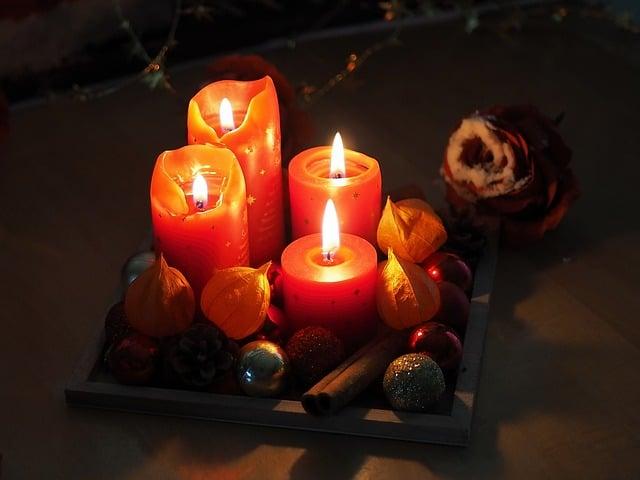In a quaint village, nestled between rolling hills, the townsfolk prepared for the festive season. Each December, they gathered to light candles, counting down the days to a special celebration. Some called it Advent, a tradition rooted in Catholic faith, while others simply enjoyed the warmth of community and the promise of joy. As the first candle flickered to life, a curious child asked, “Is Advent only for Catholics?” The village elder smiled, “Advent is a journey of hope, shared by many, reminding us that light can be found in every heart, regardless of belief.”
Table of Contents
- Exploring the Origins of Advent Beyond Catholic Traditions
- Understanding Advent Practices in Various Christian Denominations
- The Role of Advent in Secular Celebrations and Cultural Contexts
- Embracing Advent: Tips for Inclusive Observance Across Faiths
- Q&A

Exploring the Origins of Advent Beyond Catholic Traditions
While Advent is often associated with Catholic traditions, its roots extend far beyond the confines of a single denomination. The practice of preparing for the celebration of Christmas can be traced back to early Christian communities, where the focus was on spiritual reflection and anticipation. Various Protestant denominations have embraced the season, adapting its observance to fit their theological frameworks. For instance, many Anglican and Lutheran churches incorporate Advent wreaths and candles into their worship, symbolizing hope, peace, joy, and love. This shared practice highlights a broader Christian commitment to the themes of waiting and preparation, transcending denominational boundaries.
Moreover, Advent has found its way into secular celebrations and cultural practices, illustrating its universal appeal. In many regions, the season is marked by festive activities that emphasize community and togetherness. **Advent calendars**, for example, have become popular in households of all backgrounds, serving as a countdown to Christmas with daily surprises that foster excitement. Additionally, **Advent markets** and **community events** often emerge, showcasing local crafts, foods, and traditions that bring people together in celebration. This blending of sacred and secular elements demonstrates that the essence of Advent—anticipation and joy—resonates with a diverse audience, inviting everyone to partake in the spirit of the season.

Understanding Advent Practices in Various Christian Denominations
Advent, often associated with the Catholic Church, is a season of preparation for the celebration of the birth of Jesus Christ. However, its observance is not limited to Catholicism. Various Christian denominations have embraced Advent, each adding their unique traditions and interpretations. For instance, many Protestant churches observe Advent with the lighting of candles on an Advent wreath, symbolizing hope, peace, joy, and love. This practice serves as a visual reminder of the approaching Christmas and encourages congregants to reflect on the significance of Christ’s coming.
In addition to the lighting of candles, some Anglican and Lutheran communities incorporate special liturgies and hymns during this season. These practices often include readings from the Scriptures that focus on the themes of anticipation and preparation. Furthermore, many Methodist and Baptist churches have also adopted Advent calendars and devotional materials to engage their congregations in daily reflections leading up to Christmas. This diversity in observance highlights that Advent is a rich tapestry of traditions that transcends denominational boundaries, inviting all Christians to participate in a shared journey of spiritual preparation.

The Role of Advent in Secular Celebrations and Cultural Contexts
While Advent is traditionally rooted in Christian liturgical practices, its influence has permeated various secular celebrations and cultural contexts. In many communities, the season has evolved beyond its religious origins, becoming a time for reflection, family gatherings, and festive activities. This transformation allows individuals of diverse backgrounds to engage with the spirit of the season, often incorporating elements that resonate with their own cultural practices. For instance, the use of Advent calendars has gained popularity as a fun way to count down to the holidays, regardless of religious affiliation. These calendars often feature chocolates, toys, or messages of goodwill, emphasizing the joy and anticipation that the season brings.
Moreover, the themes of hope, preparation, and community that are central to Advent resonate widely, making it a fitting backdrop for various secular festivities. Many people embrace the idea of “Advent-like” celebrations, focusing on the values of generosity and kindness during this time of year. Activities such as community service, holiday markets, and family traditions can reflect the essence of Advent without explicitly adhering to its religious significance. This blending of cultural practices highlights the adaptability of Advent, allowing it to serve as a unifying force that transcends its origins and fosters a sense of togetherness among people from all walks of life. Some common secular adaptations include:
- Community gatherings that emphasize sharing and connection.
- Seasonal decorations that celebrate winter themes and festive cheer.
- Charitable initiatives that encourage giving back to those in need.

Embracing Advent: Tips for Inclusive Observance Across Faiths
Advent, traditionally observed in the Christian calendar, is often associated with Catholic practices, but its essence can resonate across various faiths and cultures. To foster inclusivity during this season, consider incorporating elements that celebrate the spirit of anticipation and reflection. Here are some ideas to embrace the season in a way that welcomes diverse perspectives:
- Community Gatherings: Organize interfaith gatherings that focus on themes of hope, peace, and joy, allowing participants to share their own traditions and stories.
- Shared Rituals: Create a communal Advent wreath that includes symbols from different faiths, encouraging dialogue about the significance of light and renewal.
- Acts of Kindness: Promote a collective initiative for charitable acts, inviting everyone to contribute in ways that align with their beliefs, fostering a sense of unity.
- Storytelling Sessions: Host storytelling events where individuals can share tales from their own traditions that reflect the values of the season, enriching the experience for all.
By embracing the core values of Advent—anticipation, reflection, and community—individuals from various backgrounds can find common ground. This approach not only honors the origins of Advent but also opens the door for meaningful connections among different faiths. Consider these practices as a way to cultivate an environment where everyone feels valued and included, transforming the observance into a shared journey of hope and understanding.
Q&A
-
Is Advent celebrated only by Catholics?
No, Advent is not exclusive to Catholics. While it is a significant season in the Catholic Church, many Protestant denominations also observe Advent as a time of preparation for Christmas.
-
What is the purpose of Advent?
Advent serves as a period of reflection, anticipation, and preparation for the celebration of the birth of Jesus Christ. It encourages believers to focus on spiritual readiness and hope.
-
How do different denominations observe Advent?
Observances can vary widely. Some churches use Advent calendars, lighting candles on an Advent wreath, or holding special services, while others may emphasize personal reflection and prayer.
-
Can non-Christians participate in Advent traditions?
Absolutely! Many Advent traditions, such as lighting candles or creating an Advent calendar, can be enjoyed by anyone as a way to celebrate the season of giving and reflection, regardless of religious affiliation.
As we unwrap the layers of Advent, it becomes clear that this season transcends denominational boundaries. Whether celebrated in Catholicism or embraced by other traditions, Advent invites all to reflect, prepare, and find joy in the coming light.

大家好,我是彼得潘,專業的手法身體治療師。我喜歡探索和研究各種主題,並透過與人工智慧的合作分享專業、實用、有趣的文章。我們定期進行人工審核,以確保內容的準確性。如果您發現文章中有任何不準確的地方,請隨時與我們聯繫,我們會及時糾正。您可以透過 [email protected] 與我們聯繫。



